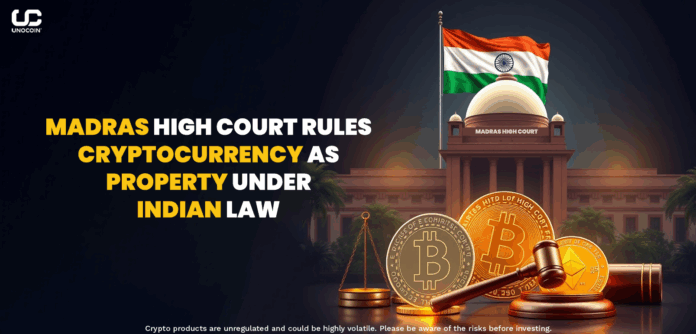In a landmark decision that could redefine the future of digital finance in India, the Madras High Court has officially recognised cryptocurrency as “property” under Indian law. The ruling marks a significant milestone for investors, exchanges, and blockchain innovators, providing long-awaited legal clarity on the status of virtual assets in the country.
A Historic Legal Recognition
Justice N. Anand Venkatesh, presiding over the case, declared that cryptocurrencies, though intangible, possess the attributes of property — capable of ownership, possession, and transfer. The court stated that crypto assets “are not currency, nor tangible assets, but are properties capable of being enjoyed, transferred, and held in trust.”
This legal acknowledgement came while hearing a petition involving a dispute over 3,532 XRP tokens frozen after a cyberattack on an exchange account. The court upheld the investor’s right to the tokens, ruling that digital assets deserve the same protection as traditional forms of property under Indian law.
A Step Towards Regulatory Maturity
Until now, the absence of a clear legal definition for cryptocurrencies has left investors and institutions navigating a grey zone. The Madras High Court’s verdict helps bridge this gap by aligning Indian jurisprudence with international precedents such as Ruscoe v. Cryptopia Ltd (New Zealand), where crypto was also treated as intangible property.
By classifying digital tokens as property, the court indirectly strengthens their standing under Section 2(47A) of the Income Tax Act, 1961, which already defines “virtual digital assets.” This means investors’ holdings are not just speculative numbers on a blockchain — they are recognised legal assets capable of being owned, inherited, or held in trust.
Why This Matters for the Crypto Ecosystem
This ruling comes at a crucial time for India’s rapidly expanding crypto ecosystem. Exchanges, investors, and projects now have stronger legal grounds to defend ownership, recover assets, and structure their operations more transparently.
For traders, it enhances confidence in digital asset ownership — a critical factor for mainstream adoption. For businesses, it opens new doors for innovation, as crypto-backed products, tokenised property, and DeFi applications gain a firmer legal foundation.
Moreover, it underscores India’s gradual shift toward a balanced regulatory approach — acknowledging crypto’s risks while embracing its potential to modernise finance.
Implications for Investors and Projects
Recognising cryptocurrencies as property paves the way for clearer taxation, estate transfers, and dispute resolution. However, it also signals the beginning of stricter accountability. Exchanges must ensure transparent custody practices, investors should maintain accurate records for taxation, and project founders must comply with AML and KYC norms.
A New Chapter for India’s Digital Future
The Madras High Court’s verdict is not merely a legal milestone — it’s a statement of progress. It validates the legitimacy of digital ownership and aligns India’s stance with global standards. As the nation prepares for a blockchain-driven decade, this recognition could serve as the cornerstone for future regulation, investor protection, and innovation.
Please find the list of authentic Unocoin accounts for all your queries below:Twitter: https://twitter.com/Unocoin
Telegram Group: https://t.me/Unocoin_Group
Telegram Channel: https://t.me/+fasQhTKBsfA5N2Zl
E-mail id: [email protected]
Other links: linktr.ee/unocoin
Contact details: 7788978910 (09:30 AM IST – 06:30 PM, Mon-Sat)
App store link: https://apps.apple.com/us/app/unocoin/id1030422972?ls=1
Playstore link: https://play.google.com/store/apps/details?id=com.unocoin.unocoinwallet
Disclaimer: Crypto products are unregulated as of this date in India. They could be highly volatile. At Unocoin, we understand that there is a need to protect consumer interests, as this form of trading and investment has risks that consumers may not be aware of. To ensure that consumers who deal in crypto products are not misled, they are advised to DYOR (Do Your Own Research).







